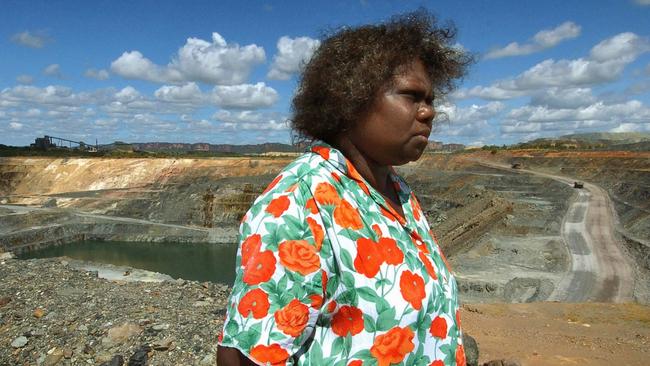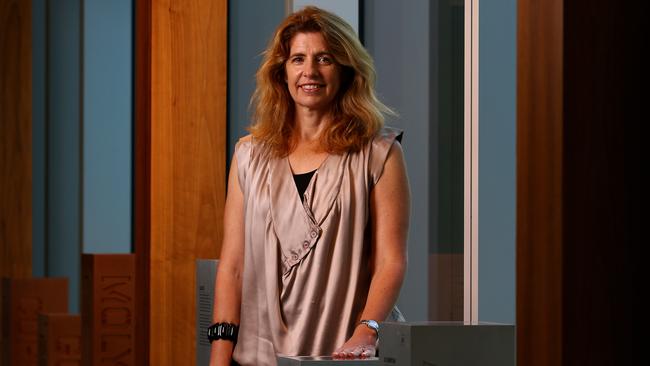A new report has ERA in trouble with parent company Rio Tinto and Traditional Owners
A new report has caused half the ERA independent Board Committee to resign after it recommended mining Jabiluka to pay for the $2.2bn Ranger Mine rehabilitation plan. Read what comes next.
Indigenous Affairs
Don't miss out on the headlines from Indigenous Affairs. Followed categories will be added to My News.
Traditional owners have hit out at a report suggesting mining a new sacred site would fund the Ranger uranium mine’s $2.2bn rehabilitation plan.
The Energy Resources of Australia commissioned the report, prepared by an independent valuer, after Rio Tinto said the mine’s rehabilitation would cost an additional $1.2bn.
Rio Tinto condemned the report’s recommendations, before ERA board chairman Peter Mansell and non-executive directors Paul Dowd and Shane Charles resigned.
Prior to the resignations Rio Tinto released a statement disagreeing with the independent valuation report prepared by Grant Thornton.
Mr Mansell, Mr Dowd and Mr Charles’ resignations leaves the board open to a complete Rio Tinto take over who hold the remaining three seats, and an 86 per cent share in the company.
WHAT IS THE HISTORY OF JABILUKA?
Rio Tinto is still repairing ties with First Nations’ people after destroying sacred rock shelters at Juukan Gorge in Western Australia in 2020.

But Mirarr senior Traditional Owner Yvonne Margarula said it seemed the mining industry had not learnt from the Juukan Gorge incident.
“I’ve been telling the world about the sacred sites for 40 years and still they don’t listen,” she said.
“We have said no and no means no; I stood up with my family and with people from everywhere, all over the world, we all said no.”
Thousands of protesters joined Mirrar 24 years ago in Kakadu to block mining at Jabiluka uranium mine, and it remains one of the nation’s largest blockades.
Corben Madjandi is one of the younger generation of Mirarr Traditional Owners.
“This is our culture, it’s our life. It also belongs to all of Australia, it’s your culture, too. We don’t just say no, we are saying never,” he said.
“This report tells me the mining industry is not listening – it’s like we’re talking to ourselves. Are they deaf to us?”.
Gundjeihmi Aboriginal Corporation chief executive Justin O’Brien, who represents Mirarr People, said the report was disappointing.
“It suggests that the only issue worth considering is economic benefit. It has re-characterised our co-operation with rehabilitation activities as some kind of support for mining in general,” he said.
Mr O’Brien said the company must admit that no matter how much uranium was there, the company’s tenure was limited as the mining lease was due to expire in 2024.

RIO TINTO’S COMMITTMENT TO MIRARR PEOPLE
Rio Tinto Australian chief executive Kellie Parker said the company was committed to rehabilitating the environment to a standard similar to the surrounding Kakadu National Park was handed back to Mirarr People.
“We are actively seeking to reflect the wishes of the Mirarr People in our approach to the funding of ERA’s rehabilitation having long understood their opposition to further mining on their country,” she said.
“We believe the successful rehabilitation of the Ranger Project Area, which is of critical importance to the Mirarr People, Rio Tinto and ERA, can be achieved in a way that is consistent with the Mirarr People’s wishes.”
Ms Parker said that remained the company’s utmost priority and commitment.
“We are again asking the ERA independent Board Committee to urgently develop a workable plan to fund the increased rehabilitation costs.”
Rio Tinto said any funds ERA raised should be strictly dedicated to rehabilitation and not any future development.
There is no “long-term plan†as there's no legal path for mining long term. This is why R3 Deeps was written off. The authority to mine has expired. The avg investor may not be reading Annual Report, it's time for ERA board to respond to this nonsense with cold hard facts.
— Justin O'Brien (@JustinOBrienGAC) October 5, 2022
2/2
WHAT DID THE REPORT RECOMMEND?
Gundjeihmi Aboriginal Corporation said the report raised further concerns by claiming mining at Jabiluka could be conducted underground and that would “solve waste rock management in Kakadu National Park”.
“We are also alarmed by the report treating the widely condemned 1982 Jabiluka Agreement as a precedent for consent,” he said.
“Admittedly, it was almost anything goes for mining in the 1980s but the relentless harassment of Traditional Owners to achieve consent for the Jabiluka Agreement is something this country should never replicate.”
Mr O’Brien said Australia had become a more mature nation and Indigenous rights were better recognised in 2022.




